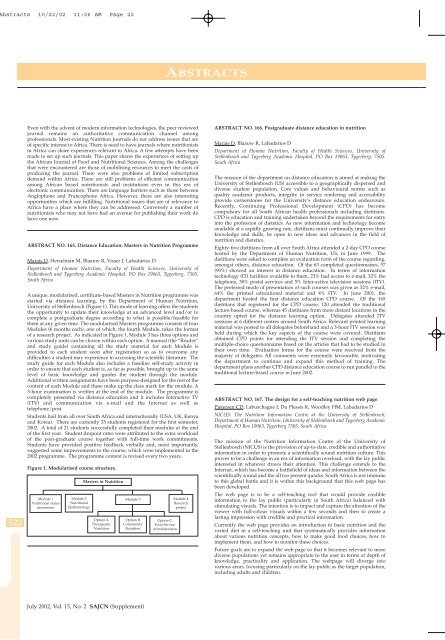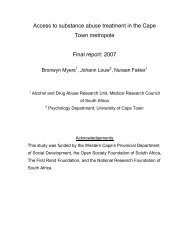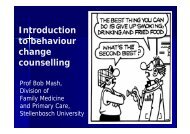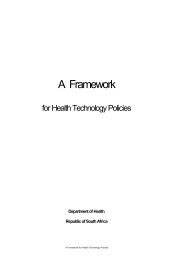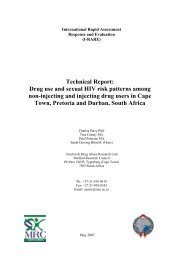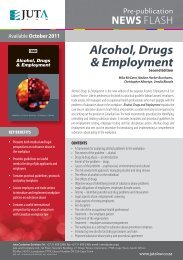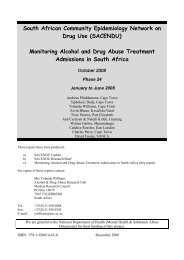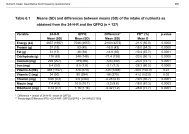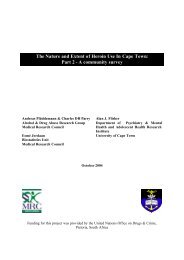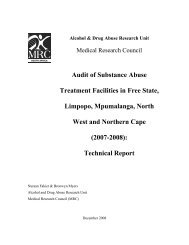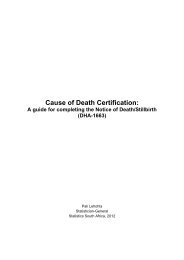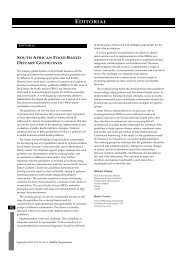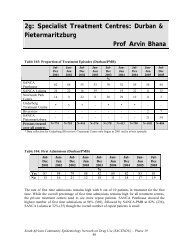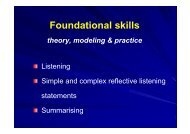Pan-African Conference 21 - 24 July 2002 Inter-Continental Hotel ...
Pan-African Conference 21 - 24 July 2002 Inter-Continental Hotel ...
Pan-African Conference 21 - 24 July 2002 Inter-Continental Hotel ...
Create successful ePaper yourself
Turn your PDF publications into a flip-book with our unique Google optimized e-Paper software.
Abstracts 10/22/02 11:26 AM Page 22<br />
S22<br />
Even with the advent of modern information technologies, the peer reviewed<br />
journal remains an authoritative communication channel among<br />
professionals. Most existing Nutrition Journals do not address issues that are<br />
of specific interest to Africa. There is need to have journals where nutritionists<br />
in Africa can share experiences relevant to Africa. A few attempts have been<br />
made to set up such journals. This paper shares the experiences of setting up<br />
the <strong>African</strong> Journal of Food and Nutritional Sciences. Among the challenges<br />
that were encountered are those of mobilising resources to meet the costs of<br />
producing the journal. There were also problems of limited subscription<br />
demand within Africa. There are still problems of efficient communication<br />
among <strong>African</strong> based nutritionists and institutions even in this era of<br />
electronic communication. There are language barriers such as those between<br />
Anglophone and Francophone Africa. However, there are also interesting<br />
opportunities which are fulfilling. Nutritional issues that are of relevance to<br />
Africa have a place where they can be addressed. Conversely a number of<br />
nutritionists who may not have had an avenue for publishing their work do<br />
have one now.<br />
ABSTRACT NO. 165. Distance Education: Masters in Nutrition Programme<br />
Marais D, Herselman M, Blaauw R, Visser J, Labadarios D<br />
Department of Human Nutrition, Faculty of Health Sciences, University of<br />
Stellenbosch and Tygerberg Academic Hospital, PO Box 19063, Tygerberg, 7505,<br />
South Africa<br />
A unique, modularised, certificate-based Masters in Nutrition programme was<br />
started via distance learning, by the Department of Human Nutrition,<br />
University of Stellenbosch (Figure 1). This mode of learning offers the students<br />
the opportunity to update their knowledge at an advanced level and/or to<br />
complete a postgraduate degree according to what is possible/feasible for<br />
them at any given time. The modularised Masters programme consists of four<br />
Modules (6 months each), one of which, the fourth Module, takes the format<br />
of a research project. As indicated in Figure 1, Module 3 has three options and<br />
various study units can be chosen within each option. A manual (the “Reader”<br />
and study guide) containing all the study material for each Module is<br />
provided to each student soon after registration so as to overcome any<br />
difficulties a student may experience in accessing the scientific literature. The<br />
study guide for each Module also includes a baseline self-study activity in<br />
order to ensure that each student is, as far as possible, brought up to the same<br />
level of basic knowledge and guides the student through the module.<br />
Additional written assignments have been purpose-designed for the rest of the<br />
content of each Module and these make up the class mark for the module. A<br />
3-hour examination is written at the end of the module. The programme is<br />
completely presented via distance education and it includes <strong>Inter</strong>active TV<br />
(ITV) and communication via e-mail and the <strong>Inter</strong>net as well as<br />
telephone/post.<br />
Students hail from all over South Africa and internationally (USA, UK, Kenya<br />
and Korea). There are currently 33 students registered for the first semester,<br />
<strong>2002</strong>. A total of <strong>21</strong> students successfully completed their modules at the end<br />
of the first year. Student dropout rates were attributed to the extra workload<br />
of the post-graduate course together with full-time work commitments.<br />
Students have provided positive feedback verbally and, most importantly,<br />
suggested some improvements to the course, which were implemented in the<br />
<strong>2002</strong> programme. The programme content is revised every two years.<br />
Figure 1. Modularised course structure.<br />
Module 1<br />
Nutritional status<br />
assessment<br />
Module 2<br />
Nutritional<br />
Epidemiology<br />
Masters in Nutrition<br />
Option A<br />
Therapeutic<br />
Nutrition<br />
Module 3<br />
Option B<br />
Community<br />
Nutrition<br />
<strong>July</strong> <strong>2002</strong>, Vol. 15, No. 2 SAJCN (Supplement)<br />
Option C<br />
Food Service<br />
Administration<br />
ABSTRACTS<br />
Module 4<br />
Research<br />
project<br />
ABSTRACT NO. 166. Postgraduate distance education in nutrition<br />
Marais D, Blaauw R, Labadarios D<br />
Department of Human Nutrition, Faculty of Health Sciences, University of<br />
Stellenbosch and Tygerberg Academic Hospital, PO Box 19063, Tygerberg, 7505,<br />
South Africa<br />
The mission of the department on distance education is aimed at making the<br />
University of Stellenbosch (US) accessible to a geographically dispersed and<br />
diverse student population. Core values and behavioural norms such as<br />
quality academic products, integrity in service rendering and accessibility<br />
provide cornerstones for the University’s distance education endeavours.<br />
Recently, Continuing Professional Development (CPD) has become<br />
compulsory for all South <strong>African</strong> health professionals including dietitians.<br />
CPD is education and training undertaken beyond the requirements for entry<br />
into the profession of dietetics. As new information and technology become<br />
available at a rapidly growing rate, dietitians must continually improve their<br />
knowledge and skills, be open to new ideas and advances in the field of<br />
nutrition and dietetics.<br />
Eighty-five dietitians from all over South Africa attended a 2-day CPD course<br />
hosted by the Department of Human Nutrition, US, in June 1999. The<br />
dietitians were asked to complete an evaluation form of the course regarding,<br />
amongst others, distance education. Of the 63 completed questionnaires, 57<br />
(90%) showed an interest in distance education. In terms of information<br />
technology (IT) facilities available to them, 23% had access to e-mail, 32% the<br />
telephone, 38% postal services and 5% <strong>Inter</strong>-active television sessions (ITV).<br />
The preferred mode of presentation of such courses was given as 32% e-mail,<br />
64% the printed educational material and 4% ITV. In June 2001, the<br />
department hosted the first distance education CPD course. Of the 165<br />
dietitians that registered for the CPD course, 120 attended the traditional<br />
lecture-based course, whereas 45 dietitians from more distant locations in the<br />
country opted for the distance learning option. Delegates attended ITV<br />
sessions at 6 different centres around South Africa. Relevant printed learning<br />
material was posted to all delegates beforehand and a 3-hour ITV session was<br />
held during which the key aspects of the course were covered. Dietitians<br />
obtained CPD points for attending the ITV session and completing the<br />
multiple-choice questionnaires based on the articles that had to be studied in<br />
their own time. Evaluation forms for the course were received from the<br />
majority of delegates. All comments were extremely favourable, motivating<br />
the department to continue and expand this method of training. The<br />
department plans another CPD distance education course to run parallel to the<br />
traditional lecture-based course in June <strong>2002</strong>.<br />
ABSTRACT NO. 167. The design for a self-teaching nutrition web page<br />
Pietersen CD, Labuschagne I, Du Plessis K, Woodley HM, Labadarios D<br />
NICUS: The Nutrition Information Centre at the University of Stellenbosch;<br />
Department of Human Nutrition, University of Stellenbosch and Tygerberg Academic<br />
Hospital, PO Box 19063, Tygerberg 7505, South Africa<br />
The mission of the Nutrition Information Centre of the University of<br />
Stellenbosch (NICUS) is the provision of up-to-date, credible and authoritative<br />
information in order to promote a scientifically sound nutrition culture. This<br />
proves to be a challenge in an era of information overload, with the lay public<br />
interested in whatever draws their attention. This challenge extends to the<br />
<strong>Inter</strong>net, which has become a battlefield of ideas and information between the<br />
scientifically sound and the all too present quacks. South Africa is not immune<br />
to this global battle and it is within this background that this web page has<br />
been developed.<br />
The web page is to be a self-teaching tool that would provide credible<br />
information to the lay public (particularly in South Africa) balanced with<br />
stimulating visuals. The intention is to impact and capture the attention of the<br />
viewer with full-colour visuals within a few seconds and then to create a<br />
lasting impression with credible and practical information.<br />
Currently the web page provides an introduction to basic nutrition and the<br />
varied diet in a self-teaching unit that systematically provides information<br />
about various nutrition concepts, how to make good food choices, how to<br />
implement them, and how to monitor these choices.<br />
Future goals are to expand the web page so that it becomes relevant to more<br />
diverse populations yet remains appropriate to the user in terms of depth of<br />
knowledge, practicality and application. The webpage will diverge into<br />
various areas, focusing particularly on the lay public as the target population,<br />
including adults and children.


